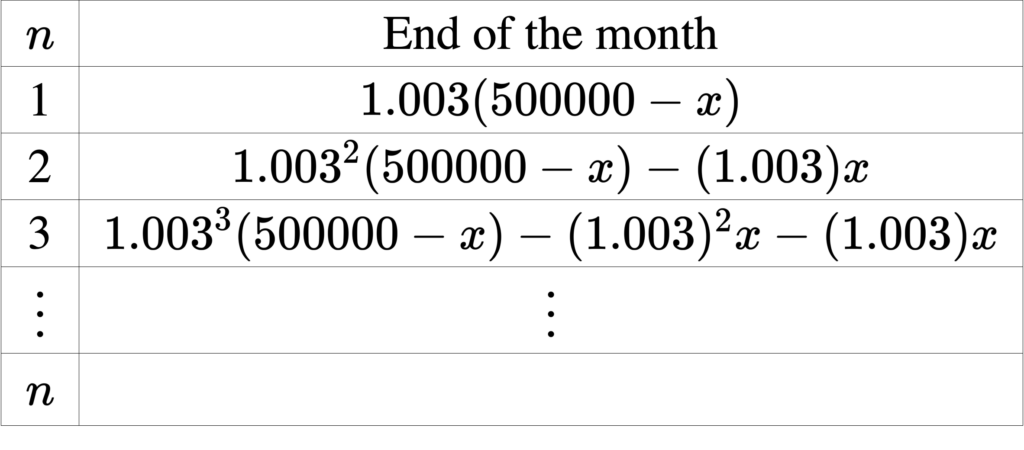Mrs Tan plans to start a business which requires a start-up capital of $\$ 700,000$. She decided to first save $\$ 200,000$ by depositing money every month into a savings plan. For the remaining $\$ 500,000$, she intends to take a loan from a finance company.
She deposited $\$ 3000$ into the savings plan in the first month and on the first day of each subsequent month, she deposited $\$ 100$ more than the previous month. Mrs Tan will continue depositing money into the savings plan until the total amount in her savings plan reaches $\$ 200,000$. It is given that this savings plan pays no interest.
(i) Find the month in which Mrs Tan’s monthly deposit will exceed $\$ 6,550$.
[2]
(ii) Find the number of months that it will take for Mrs Tan to save $\$ 200,000$ and hence find the amount that she would have deposited in the last month.
[4]
(iii) Show that the outstanding amount at the end of $n^{\text {th }}$ month, after the interest has been charged, is $A\left(1.003^n\right)-B x\left(1.003^n-1\right)$, where $A$ and $B$ are exact constants to be determined.
[3]
(iv) Find the amount of $x$, to 2 decimal places, if Mrs Tan wants to fully repay her loan in 8 years.
[2]
(v) Using the value of $x$ found in part (iv), calculate the total interest that the finance company will earn from Mrs Tan at the end of 8 years.
[2]
(i) $37th$ month
(ii)$41$ months, $\$2000$
(iii) $A=500000, B=\frac{1003}{3}$
(iv) $x=\$ 5984.09$
(v) $\$ 74,472.64$
(i)
$U_n>6550$
$3000+(n-1) 100>6550$
$n>36.5$
$\therefore 37^{\text {th }}$ month
(ii)
$S_n=\frac{n}{2}[6000+(n-1) 100]$
$\frac{n}{2}[6000+(n-1) 100] \geq 200,000$
Method 1 – by GC
When $n=40, y=198,000<200,000$ When $n=41, y=205,000>200,000$
$\therefore 41$ months
$S_{40}=\frac{40}{2}[6000+(40-1) 100]=\$ 198,000 $
$ 200,000-\$ 198,000=\$ 2000$
(iii)

$1.003^n(500000-x)-(1.003)^{n-1} x-\ldots-(1.003) x+5 $
$=1.003^n\left(500000-\left(1.003^n\right) x-\ldots(1.003) x 0\right. $
$=1.003^n(500000)-x\left[1.003+1.003^2+\ldots+1.003^n\right] $
$=1.003^n(500000)-x\left[\frac{1.003(1.003-1)}{1.003-1}\right] $
$=1.003^n(500000) \frac{1003}{3} x\left(1.003^n-1\right) $
$\therefore A=5000005 B=\frac{1003}{3}$
(iv)
$1.003^{96}(500000)-\frac{1003}{3} x\left(1.003^{96}-1\right)=0$
Using GC, $x=\$ 5984.09$.
(v)
Total paid: $\$ 5984.09 \times 12 \times 8=\$ 574,472.64$
Interest: $\$ 574,472.64-\$ 500,000=\$ 74,472.64$